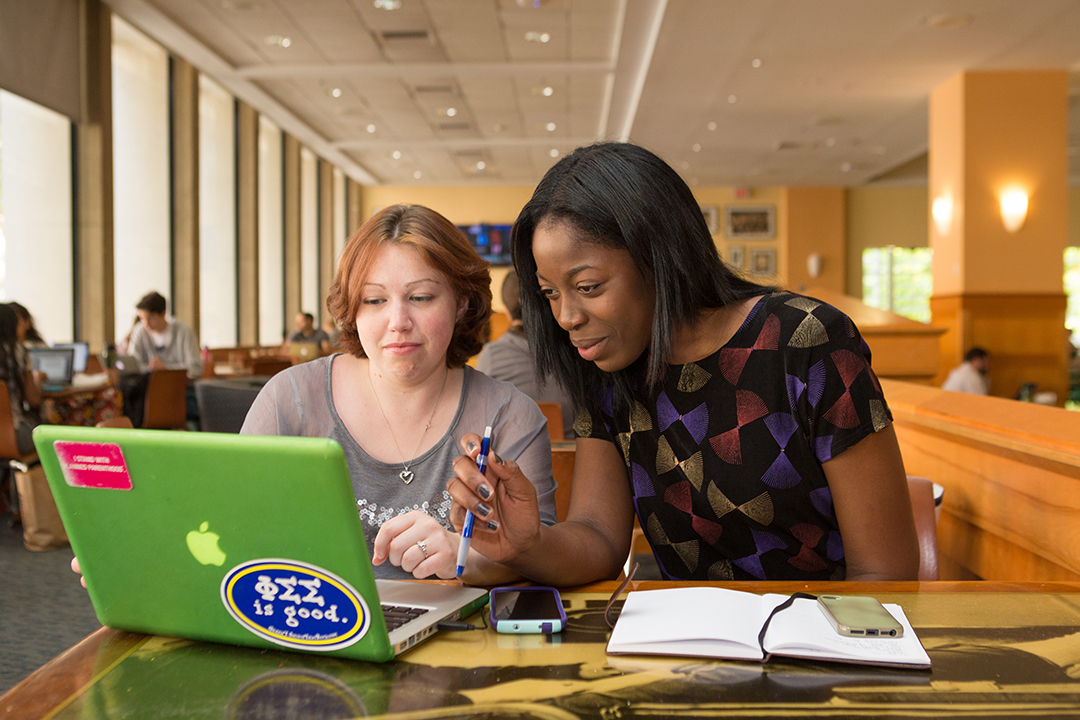When Samantha Yakas first met with an advisor during her freshman year at GW, the counselor gave her what, in many cases, would be good advice: Take time to explore your passions, he told her. Try some electives and see where they take you.
But to Yakas, who graduates this spring with a double major in English and Women’s Studies, academic experimentation was out of the question. Yakas is a first-generation college student. Neither of her parents —or, for that matter, anyone on either side of her family—had ever attended college before her. Her father, a Pennsylvania diesel mechanic who works 60 hours a week, sent Yakas to college with clear instructions. She was to stay focused and work toward a career. Going to college was a precious opportunity, he said. Keep your eye on the prize.
“There was no way I could go home on Thanksgiving and tell my dad I’m taking, let’s say, pottery,” Yakas said. “That’s just not part of the plan.”
For many young people, college is a time to stretch intellectual and social horizons, and make new discoveries about themselves and the world around them. But first-generation students often approach their college experience with drastically different goals—and a broader array of challenges and obstacles—than their second- and third-generation peers. Lacking a strong support network, many see college as an intimidating and often lonely landscape. And many tend to be less engaged on campus because they are frequently juggling one or more jobs along with their studies.
Knowing these challenges, Columbian College launched a pilot program in the fall to help ease the transition to college for first-generation students. Administered through the college’s undergraduate academic advising office, the program teams incoming first-generation students with mentors like Yakas to help navigate potential campus pitfalls. A mentor may guide new students through the confusing registration process, or teach them how to craft a resume for a coveted internship, or simply send an encouraging email when finals-induced stress threatens to become overwhelming.
“The role of the mentor is to communicate with the new student and provide them with encouragement,” said Bea Fernández, an undergraduate academic advisor and the coordinator of the mentoring program. “If you are first-generation, you don’t have a sibling or a parent who can guide you through that first semester. A mentor is a peer who can answer the questions you can’t ask anyone else.”
During its inaugural year, the program recruited six mentors, primarily through campus fliers, Hatchet advertisements, and word-of-mouth. Yakas learned about the program during office hours with English Professor Antonio Lopez, who was also the first in his family to attend college. Fernández was able to identify a pool of nearly 50 first-generation freshmen. About half of them responded to email overtures from mentors to attend study sessions and informal get-togethers.
Pride and Pressure
It is estimated that approximately five percent of GW’s incoming students are the first in their family to attend college. After hearing some of their stories and the challenges they face, a group of faculty met in 2012 to put together a proposal for mentoring these students—a proposal that became the basis for this year’s pilot program. Gilbert Cisneros (BA ’94), a Columbian College alumnus and fellow first-generation graduate, donated funds to help launch the pilot program and provide a small stipend for the mentors.
Nationally, the odds are stacked against first-generation student college success. While their attendance rates are steadily rising—particularly at public universities and two-year institutions— they are still twice as likely to leave school before completing a degree, compared to students whose parents went to college. Even among students who flourish academically, the stresses accompanying being first-generation—from financial strains to social constraints—can cloud their accomplishments with anxiety.
Yakas remembered having a conversation with Nana Agyemang, a sophomore transfer student whose parents immigrated from Ghana. Agyemang talked about her frustrations, which included holding down two jobs that consumed 20 hours of her week and having to survive on pizza and ramen noodles to stay within budget. An exasperated Agyemang pleaded to Yakas: “You understand, don’t you?”
“The truth is: I really did understand,” recalled Yakas, who took on part-time jobs and tutoring assignments as a student. “That’s what we are trying to accomplish as mentors. We’re letting other students know that there’s someone who understands.”
“There’s a lot of pride when you’re the first person in your family to go to college, but there’s a lot of responsibility and pressure too,” added Yesenia Flores, a senior biology major and first-generation student who also served as a mentor. “My parents worked hard to give me this opportunity. The worst thing I could do is fail. I wouldn’t just be letting myself down. I’d be letting down my entire family.”
Based on the success of the pilot program, Fernández hopes to expand its presence across the university and organize monthly gatherings to address first-generation concerns. She also plans to invite faculty and alumni speakers to present advice and direction to mentors and mentees alike. “We are just getting started and we have a long way to go,” Fernández said. “For now, our biggest priority is to identify students and let them know that there’s a resource available to them.”
For more information about the first-generation mentoring program, send an email to Bea Fernández at beafndz![]() gwu [dot] edu (beafndz[at]gwu[dot]edu).
gwu [dot] edu (beafndz[at]gwu[dot]edu).


